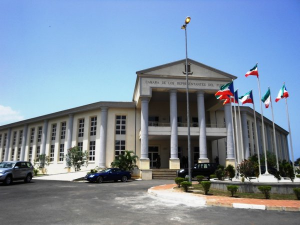 The political system of Equatorial Guinea sits within the framework of a presidential republic, whereby the President is both the head of state and head of government. Executive power is exercised by the government as a whole.
The political system of Equatorial Guinea sits within the framework of a presidential republic, whereby the President is both the head of state and head of government. Executive power is exercised by the government as a whole.
Legislative power is vested in the government and the Chamber of People’s Representatives and – since the elections of 26 May 2013 – in the Senate, a new chamber with 55 members.
Since Equatorial Guinea gained independence in 1968, the subsequent two Presidents (Macías and Obiang) have been the key political influences in Equatorial Guinea. President Obiang’s rule has seen schools reopen and primary education expanded, with public utilities and roads restored. The country’s main legal and administrative system is established in the 1982 Constitution, which was co-written with the support of the UN.
At present, the ruling party in Equatorial Guinea is the Democratic Party of Equatorial Guinea formed (PDGE) in 1987. Opposition parties were legalised in 1991, but the PDGE has been the dominant party since its inception. Today the PDGE is formed by a coalition of 13 political parties which together reflect the ethnic, economic and social reality of the country. More than 90% of the population in Equatorial Guinea is affiliated to this coalition party.
The judicial system follows different administrative levels; at the top the judicial advisors (the Supreme Court). In descending rank are the appeals courts, chief judges for the divisions, and local magistrates.

